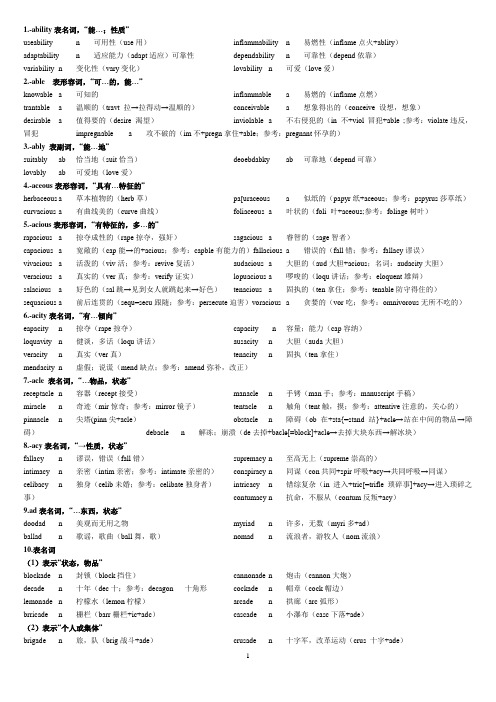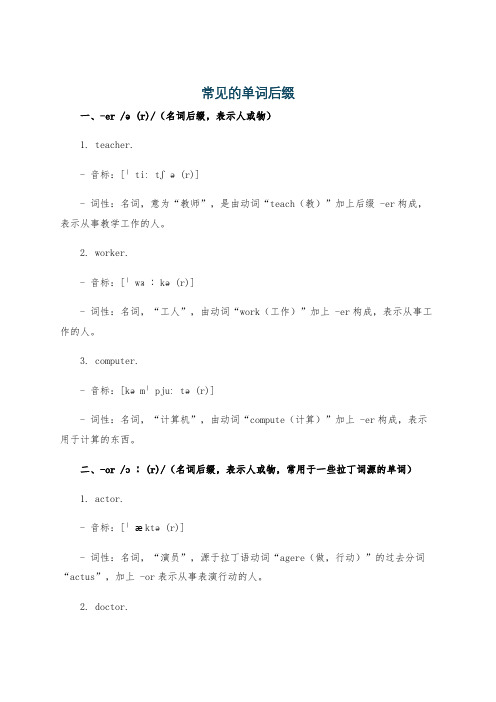单词后缀与词性
由英语单词后缀判定词性

由英语单词后缀判定词性后是一种重要的构法,通后常常可以判断出一个的性。
一个英可以分三个局部:前〔 prefix〕,根〔 stem〕及后〔 suffix 〕。
中位于根前面的局部就是前。
前,可以改的意思。
在言学里,后,又称尾,是一种后置于其他素后的。
后 -名解以英例: establish〔〕 + -ment 〔后〕— > establishment 〔名〕:借由后 -ment 的使用,使原本的素名,言的衍生,是后的一种用途后 -名后常的此后及其具体含如下:1.-ster,-eer,-er〔or 〕意:从事某种或参与某种活的人〔person engaged in anoccupation or activity 〕例:gamester ,gangster,songster,engineer ,profiteer ,mountaineer ,auctioneer ,driver , teacher ,director , actor , professor2.-let 意:小或者不重要的西〔small,unimportant things 〕例: booklet ,leaflet ,starlet3.-ette 意:1〕小的西〔 small〕例:cigarette 2 〕假的西〔 imitation 〕例:leatherette3〕女性〔 female 〕例:usherette4. -ess 意:女性〔 female 〕例: actress, poetess, hostess, paintress5. -hood 意:期〔 status; etc .〕例: boyhood , childhood , manhood6. -ship 意:才能,状,格,品等〔skill, state, condition , status, quality 〕例: leadership , friendship , membership , lectureship ,sportsmanship7.-ful 意:量〔 the amount which noun contains 〕例: cupful , handful , mouthful , spoonful8.-tion ,-ion 意: 1〕状,行等〔 state;action ;etc.〕例: action ,oppression ,possession,education ,starva- tion 2 〕机构等〔institution ;etc.〕例: organization ,foundation 9.-ment 意:状,行等〔state; action; etc.〕例: movement ,enslavement ,pavement10. -al 意:作〔 action 〕例: arrival , refusal, revival , recital , removal11.-age 意:程度,数量等〔extent ; amount ;etc.〕例:wastage,coverage, acreage,shrinkage,breakage, hostage912.-ness;-ity〔 ty〕意:状,品〔 state;quality ;etc .〕例:happiness, usefulness,selfishness,kindness ,rapidity , activity , sanity , changeability13.-ism 意:道,主,学等〔 doctrine of ,practice of 〕例:idealism , impressionism ,absenteeism ,racism后 -后常的此后及其具体含如下:1.-ify 意:,〔 to turn into ,to make or become 〕例: beautify , diversify , simplify2.-ize;-en 意:使⋯⋯,得⋯⋯〔 to make or become;to make into〕例:modernize,popularize , legalize, hospitalize ,symbolize, ripen ,widen , heighten , threaten3.-ate 意:增加,使⋯⋯听写〔 give or add,make or become 〕例:originate , hydrogenate , validate ,differentiate后 -形容后常的此后及其具体含如下:1.-ful 意:充,有〔 full of ;hav- ing;giving;etc.〕例: useful ,pitiful , hopeful ,careful,helpful , forgetful ,thankful , fearful2. -less 意:没有,无〔without ; not giving 〕例: speechless, childless,harmless,hopeless, meaningless ,homeless3.-ly 意:有⋯⋯品的〔having the qualities of 〕例: beastly,manly , brotherly ,friendly4. -like 意:像⋯⋯的〔like〕例:childlike , statesmanlike ,tiger-like5. -y; -ish 意:像⋯⋯一般的〔somewhat like 〕例: meaty , sandy, silky, hairy,leafy, watery , foolish , girlish ,blackish , thinnish6.-some 意:像⋯⋯一的;引起⋯⋯的;有⋯⋯品的〔 like;causing; having thequality of 〕例: troublesome , burdensome , wholesome , tiresome , bothersome 7.-able〔ible 〕意:能⋯⋯的;可以⋯⋯的〔 able to be ;capable〕例: changeable,realiable,readable , drinkable , comfortable ,expansible ,convincible8.-ed 意:有⋯⋯的〔 having,etc.〕例: wooded ,pointed ,moneyed , odd-shaped9.-al 意:有⋯⋯属性的,⋯⋯型的〔 nature of ,typical of 〕例: cultural ,personal,regional ,musical10. -ary〔 ory〕意:属于⋯⋯的,与⋯⋯相的〔: revolutionary , imaginary , contradictory 11. -ous 意:富含⋯⋯的;有⋯⋯品的;像⋯⋯的〔belonging to; connected with 〕例 fullof ; having the quality of ;like〕例: glorious,erroneous , malicious , gracious12.-ic〔 ical〕意:⋯⋯的;属于⋯⋯的〔 typical of ;belonging to 〕例: historic , historical , methodic ,methodical , dramatic , heroic13. -ive 意:有⋯⋯属性的;有某种向的〔having the nature or quality of;given or tending to 〕例: attractive , talkative , restrictive , defensive , preventive ,constructive , sensitive后 -副后常的此后及其具体含如下:1. -ly 意:以⋯⋯方式〔in a...manner ; etc.〕例: happily, boldly , attentive- ly ,strangely2.-ward〔 s〕意:表示方式或作的方向〔manner and direction of movement〕例:onward 〔 s〕, backward 〔s〕, earthward 〔 s〕, homeward 〔 s〕, eastward 〔 s〕3.-wise 意: 1〕按照⋯⋯方式〔 in the manner of 〕例: crabwise,clockwise2〕就⋯⋯而言〔 asfar as ...is concerned〕例: weatherwise,educationwise4.以 ly 后尾的副,比都是 +more ,如 more carefully ,more useful 最高 +most如 most carefully ,most useful。
英语后缀词性

1.-ability表名词,“能…;性质”useability n 可用性(use用)inflammability n 易燃性(inflame点火+ablity)adaptability n 适应能力(adapt适应)可靠性dependability n 可靠性(depend依靠)variability n 变化性(vary变化)lovability n 可爱(love爱)2.-able 表形容词,“可…的,能…”knowable a 可知的inflammable a 易燃的(inflame点燃)trantable a 温顺的(travt 拉→拉得动→温顺的)conceivable a 想象得出的(conceive 设想,想象)desirable a 值得要的(desire 渴望)inviolable a 不右侵犯的(in 不+viol 冒犯+able ;参考:violate违反,冒犯impregnable a 攻不破的(im不+pregn拿住+able;参考:pregnant怀孕的)3.-ably 表副词,“能…地”suitably ab 恰当地(suit恰当)deoebdabky ab 可靠地(depend可靠)lovably ab 可爱地(love爱)4.-aceous表形容词,“具有…特征的”herbaceous a 草本植物的(herb草)pa[uraceous a 似纸的(papyr纸+aceous;参考:pspyrus莎草纸)curvacious a 有曲线美的(curve曲线)foliaceous a 叶状的(foli 叶+aceous;参考:foliage树叶)5.-acious表形容词,“有特征的,多…的”rapacious a 掠夺成性的(rape掠夺,强奸)sagacious a 睿智的(sage智者)capacious a 宽敞的(cap能→的+acious;参考:capble有能力的)fallacious a 错误的(fall错;参考:fallacy谬误)vivacious a 活泼的(viv活;参考:revive复活)audacious a 大胆的(aud大胆+acious;名词:audacity大胆)veracious a 真实的(ver真;参考:verify证实)lopuacious a 啰唆的(loqu讲话;参考:eloquent雄辩)salacious a 好色的(sal跳→见到女人就跳起来→好色)tenacious a 固执的(ten拿住;参考:tenable防守得住的)sequacious a 前后连贯的(sequ=secu跟随;参考:persecute迫害)voracious a 贪婪的(vor吃;参考:omnivorous无所不吃的)6.-acity表名词,“有…倾向”eapacity n 掠夺(rape掠夺)capacity n 容量;能力(cap容纳)loquavity n 健谈,多话(loqu讲话)ausacity n 大胆(auda大胆)veracity n 真实(ver真)tenacity n 固执(ten拿住)mendacity n 虚假;说谎(mend缺点;参考:amend弥补,改正)7.-acle 表名词,“…物品,状态”receptacle n 容器(recept接受)manacle n 手铐(man手;参考:manuscript手稿)miracle n 奇迹(mir惊奇;参考:mirror镜子)tentacle n 触角(tent触,摸;参考:attentive注意的,关心的)pinnacle n 尖塔(pinn尖+acle)obstacle n 障碍(ob在+sta{=stand 站}+acle→站在中间的物品→障碍)debacle n 解冻;崩溃(de去掉+bacle[=block]+acle→去掉大块东西→解冰块)8.-acy表名词,“→性质,状态”fallacy n 谬误,错误(fall错)supremacy n 至高无上(supreme崇高的)intimacy n 亲密(intim亲密;参考:intimate亲密的)conspiracy n 同谋(con共同+spir呼吸+acy→共同呼吸→同谋)celibacy n 独身(celib未婚;参考:celibate独身者)intricacy n 错综复杂(in进入+tric[=trifle琐碎事]+acy→进入琐碎之事)contumacy n 抗命,不服从(contum反叛+acy)9.ad表名词,“…东西,状态”doodad n 美观而无用之物myriad n 许多,无数(myri多+ad)ballad n 歌谣,歌曲(ball舞,歌)nomad n 流浪者,游牧人(nom流浪)10.表名词(1)表示“状态,物品”blockade n 封锁(block挡住)cannonade n 炮击(cannon大炮)decade n 十年(dec十;参考:decagon 十角形cockade n 帽章(cock帽边)lemonade n 柠檬水(lemon柠檬)arcade n 拱廊(arc弧形)brricade n 栅栏(barr栅栏+ic+adc)cascade n 小瀑布(casc下落+ade)(2)表示“个人或集体”brigade n 旅,队(brig战斗+ade)crusade n 十字军,改革运动(crus 十字+ade)cavalcade n 骑兵队(caval马+cade)renegade n 叛徒(renege背信弃义)11.-名词反缀(1)表示“状态,总称”tonnage n 吨位(ton 一吨)mileage n 英里数(mile英里)percentage n 百分比(percent百分之几)foliage n 树叶(foli树叶;参考:portfolio 文件夹)visage n 面貌(vis 看;参考:vision视力)advantage n 利益(ad+vant来到+age)verbiage n 冗词,赘语(verb词语)dotage n 老年昏愦(dot打盹+age)pilgrimage n 朝圣(pilgrim朝香客)marriage n 结婚(marry结婚)pillage n 掠夺(pill来自中世纪法语piller,意为“掠夺”)drainage n 排水(drain 排干)patronage n 赞助,惠客(patron赞助人)(2)表示“场所,物品”anchorage n 停泊地(anchor铁猫)village n 村庄(villa茅房,别墅)hermitage n 隐居处(hermit隐)士appendage n 附属物(append附属)heritage n 遗产(herit继承)beverage n 饮料(bever饮,喝+age)qreckage n 残骸,碎片(wreck残骸,破坏)(3)表示“费用”postage n 邮费(post邮局)railage n 铁路运费(rail铁路)towage n 拖(车、船)费(tow拖)waterage n 水运费(water水)12.-ain 表名词,“…人”captain n 船长(capt头+ain)chiefain n 酋长,头目(chief主要+tain人)villain n 恶棍(vill[=vile ]+ain)riverain n 住在河边的人(river河)13.-aire表名词millionaire n 百万富翁(million百万)koctrinaire n 教条者,空论家(doctrine教条)questionnaire n 调查表,问卷14。
常见的单词后缀

常见的单词后缀一、-er /ə(r)/(名词后缀,表示人或物)1. teacher.- 音标:[ˈtiːtʃə(r)]- 词性:名词,意为“教师”,是由动词“teach(教)”加上后缀 -er构成,表示从事教学工作的人。
2. worker.- 音标:[ˈwɜːkə(r)]- 词性:名词,“工人”,由动词“work(工作)”加上 -er构成,表示从事工作的人。
3. computer.- 音标:[kəmˈpjuːtə(r)]- 词性:名词,“计算机”,由动词“compute(计算)”加上 -er构成,表示用于计算的东西。
二、-or /ɔː(r)/(名词后缀,表示人或物,常用于一些拉丁词源的单词)1. actor.- 音标:[ˈæktə(r)]- 词性:名词,“演员”,源于拉丁语动词“agere(做,行动)”的过去分词“actus”,加上 -or表示从事表演行动的人。
2. doctor.- 音标:[ˈdɒktə(r)]- 词性:名词,“医生;博士”,有学问、能治病救人(做事)的人。
三、-ist /ɪst/(名词后缀,表示人,常表示某种主义者或从事某种职业的人)1. artist.- 音标:[ˈɑːtɪst]- 词性:名词,“艺术家”,从事艺术创作(art)的人。
2. scientist.- 音标:[ˈsaɪəntɪst]- 词性:名词,“科学家”,从事科学(science)研究的人。
四、-ness /nəs/(名词后缀,加在形容词后构成抽象名词,表示性质、状态等)1. happiness.- 音标:[ˈhæpinəs]- 词性:名词,“幸福”,由形容词“happy(快乐的)”加上 -ness,表示快乐的这种状态。
2. kindness.- 音标:[ˈkaɪndnəs]- 词性:名词,“善良;好意”,由形容词“kind(善良的)”加上 -ness,表示善良这种性质。
五、-tion /ʃn/(名词后缀,加在动词后构成抽象名词,表示行为、状态、结果等)1. action.- 音标:[ˈækʃn]- 词性:名词,“行动”,由动词“act(行动)”加上 -tion,表示行动这个概念。
(完整版)英语词性及初中常见前后缀

对单词词性的了解有助于语法的学习英语单词词性(注:黑体为词性缩略形式)n. 名词v.动词pron.代词adj. 形容词adv.副词num.数词art.冠词prep.介词conj. 连词interj. 感叹词英语词性缩写prep = 介系词;前置词,preposition的缩写pron = 代名词,pronoun的缩写n = 名词,noun的缩写v = 动词,兼指及物动词和不及物动词,verb的缩写conj = 连接词,conjunction的缩写s = 主词sc = 主词补语o = 受词oc = 受词补语vi = 不及物动词,intransitive verb的缩写vt = 及物动词,transitive verb的缩写aux.v = 助动词,auxiliary的缩写a /adj= 形容词,adjective的缩写ad/adv = 副词,adverb的缩写art = 冠词,article的缩写num = 数词,numeral的缩写int = 感叹词,interjection的缩写u = 不可数名词,uncountable noun的缩写c = 可数名词,countable noun的缩写pl = 复数,plural的缩写语气词int.缩写词abbr.abbr abbreviation(略)略语adj, adjjadjective(s)(形)形容词adv, advvadverb(s)(副)副词adv partadverbial particle(副接)副词接语aux auxiliary(助)助动词cn countable noun(可数)可数名词conj conjunction(连)连接def art definite article(定冠)定冠词eg./egfor example(例如)例如esp especially(尤指)尤指etc and the others(等)等等ie which is to say(意即)意即indef art indefinite article(不定冠词)不定冠词inf infinitive(不定词)不定词int interjection(感)感叹词n noun(s) (名)名词neg negative(ly)(否定)否定的(地)part adj participial adjective(分形)分词形容词pers person(人称)人称pers pron personal pronoun(人称代)人称代名词pl plural(复)复数(的)pp past participle (过去分词)过去分词pref prefix(字首)字首prep preposition(al) (介词)介词,介系词,介词的pron pronoun (代)代名词pt past tense(过去)过去式sb somebody(某人)某人sing singular(单)单数(的)sth something(某事物)某物或某事suff suffix(字尾)字尾un uncountable noun(不可数)不可数名词US America(n)(美)美国(的)v.verb(s) (动)动词[VP]Verb Pattern(动型)动词类型vi .verb intransitive(不及物动词)不及物动词vt. verb transitive (及物动词)及物动词除这十大类词之外,英语还另有判断词yes和no。
英语单词用词缀判断词性

英语单词用词缀判断词性集团文件发布号:(9816-UATWW-MWUB-WUNN-INNUL-DQQTY-一、名词后缀1. ce, ance, enceappear(出现, 公开露面)—appearancerefer(提交, 谈及,提到, 涉及, 查阅, 咨询)—reference(提及, 涉及, 参考, 参考书目, 证明书(人), 介绍信(人), audience, advice, allowance, ambulance, appearance2. al:arrival, refusal, revival, removal, approval4. cy :accurate(正确的, 精确的)—accuracy(精确性, 正确度)private—privacy, emergency, frequency,?urgency,?efficiency, agency5. dom:freedom, kingdom, wisdom6. er,or,ar, ist, ant, ent, ess(女): 人、职业painter, worker, beg(请求, 乞求)—beggar(乞丐), piano-pianist, violin(小提琴)—violinist, apply—applicant, correspond(通信)—correspondent(通讯记者)actress,waiter—waitress, analyst7. hood : 时期,人,关系child—childhood, man—manbood(成年男子)neighborhood(附近,邻居关系)8. ty :cruel—cruelty, pure—purity,activity, ?reality,?ability,?calamity9. ment :状态,行动等move—movement,retire—retirement,state-statement, treat-treatment,?judgment,?punishment,?argument, assignment10. ness :dark—darkness, happy—happiness, awareness,kindness,?tiredness,?11. ology : 学(学术类)biology, geology physiology psychology, technology12. ship :才能,状态,资格,品质Friendship, relationship, scholar(学者)—scholarship(奖学金, 学问, 学识)leadership,hardship,membership, oppression, possession, education13. ion,?sion,?tion,?ation,?ition:行为的过程,结果,状况decide-decision,expand-expansion,?alter-alteration,action,?solution,?conclusion,?destruction,?expressio n,?correction, oppression, ambition14. sure:measure, pressure15. th :grow—growth, wide—width, deep-depth, health,wealth,?truth,?length16. ture:nature, mature, future, agriculture, architecture二、动词后缀1.-ify意为:转为,变为class—classify(分类, 分为), simple—simplify(单一化, 简单化),2.-ize;(美)ise,(英)-en:使……,……化,变得……deep—deepen(加深, 深化), fast(紧的, 牢的)—fasten(扎牢, 扣住)(现代人)—modernise/modernize(<主英>=modernize)popular(通俗的, 流行的, 受欢迎的)—popularise/popularize(<主英> =popularize)3.-ate:增加,使……originate, hydrogenate,validate,differentiate, dictate 独裁,使…听写(dict-词根:说。
后缀的用法及意义

后缀的用法及意义摘要:一、引言二、后缀的定义和分类1.词性后缀2.词义后缀3.形态后缀三、常见词性后缀及其作用1.名词后缀2.动词后缀3.形容词后缀四、词义后缀的用法及意义1.表示程度2.表示性质3.表示状态五、形态后缀的作用及举例1.词尾变化2.词缀叠加六、后缀在语言学习中的应用1.提高词汇量2.提升表达能力3.增强语言准确性七、结论正文:一、引言语言是人与人交流的工具,其中词汇是构成语言的基本元素。
后缀是词汇构成中不可或缺的部分,它能够改变词性和词义,使语言更加丰富多彩。
本文将详细介绍后缀的用法及意义,帮助读者更好地理解和运用后缀,提高语言表达能力。
二、后缀的定义和分类后缀是指加在词根或单词后面,用来改变词性、词义或形态的词缀。
根据作用和性质,后缀可分为以下三类:1.词性后缀:改变单词的词性,如名词后缀(-s,-ment,-tion等)、动词后缀(-ate,-ize,-ify等)和形容词后缀(-ive,-ful,-ous等)。
2.词义后缀:表示程度、性质、状态等,如副词后缀(-ly,-ally,-fully 等)、形容词后缀(-able,-ible,-ful等)和名词后缀(-ness,-ship,-hood等)。
3.形态后缀:用于词尾变化,如名词复数后缀(-s,-es等)、动词过去式和过去分词后缀(-ed,-d,-tion等)以及形容词比较级和最高级后缀(-ier,-iest,-ier等)。
三、常见词性后缀及其作用1.名词后缀:如-s,表示复数;-ment,表示过程或事物,如“government”(政府);-tion,表示行为或过程,如“education”(教育)。
2.动词后缀:如-ate,表示动词,如“evaluate”(评估);-ize,表示动词,如“globalize”(全球化);-ify,表示动词,如“simplify”(简化)。
3.形容词后缀:如-ive,表示具有某种性质,如“creative”(creative);-ful,表示充满某种性质,如“useful”(有用);-ous,表示具有某种特征,如“dangerous”(危险的)。
词性及后缀

英语单词词根词缀和词性互相转换一、词形转换A.动词变名词+ ment 结尾achieve---achievement 成就advertise--- advertisement词变形容词1名词+yanger--angry hunger---hungry sleep---sleepy 昏昏欲睡的taste 口味,品味---tasty 甜的2.名词+ edbalance –balanced 平衡的spot 斑点,地点----spotted 有斑点的talent-----talented 有天赋的>3.名词+ ful/lessmeaning—meaningful 有意义的care—careful/ careless 小心的/粗心的4.名词+ ablecomfort---comfortable knowledge---knowledgeable suit 一套-----suitable 合适的5.名词+ ousenormous 巨大的danger—dangerous mystery 神秘-----mysterious 神秘的变tconfidence----confident difference---different7. al 结尾nature---natural 自然的person---personal (私人的) nation—national 国家的?8.名词+ lyfriend—friendly live---lively 活跃的,有生气的love—lovely 可爱的9.+ en 结尾wood—wooden 木制的wool—woolen 羊毛的10. 其他energy精力---energetic fool 傻子—foolish 愚蠢的freedom 自由—free 空的, 免费的height 高度—high illness 疾病--- ill love—loving 慈爱的death---dead pleasure---pleasant / pleased popularity 流行性—popular pride---proudscientist----scientific 科学的方位的词表达名词—形容词East—eastern West—western South—southern North---northern/In the west of China In the western part of China四大洲名词-----形容词Asia 亚洲--Asian Africa 非洲--- African Europe欧洲--- EuropeanAmerica 美洲-----AmericanC.形容词变副词1. 形容词+ lybad—badly bright—brightly 明亮地most 多数-----mostly 多半大多数2. 以le 结尾的去e + ycomfortable---comfortably gentle—gently possible---possibly3. 辅音字母+ y 变ily!easy—easily heavy—heavily happy--happily4.特殊good—well好地well 身体健康的,井true—truly名词---形容词—副词beauty 美,美人—beautiful—beautifully care—careful—carefully care—careless—carelessly difference---different---differently happiness—happy—happily hunger—hungry—hungrily health—healthy—healthily luck—lucky—luckily noise—noisy—noisily pride—proud—proudly骄傲地sadness—sad—sadly safety 安全安全的地方—safe—safelysilence—silent---silently 默默地success—successful—successfully@truth—true—truly unluck—unlucky—unluckily wonder 奇迹—wonderful—wonderfullyD.既是形容词又是副词early get up early ; an early trainlate be late for class come late for schooldeep dive deep into the sea a deep holehigh jump high; a high mountainhard a hard question;a hard stone work hard / study hard rain hardlong It takes too long It takes a long timefar jump far My home is far from school、straight a straight line go straight along here二、派生:指由一个词根加上前缀和(或)后缀构成另一个词的构词形式。
英语单词的前缀和后缀

英语单词的前缀和后缀一、常见前缀。
1. un -- 音标:[ʌn]- 词性:可加在形容词、副词、名词前,表示否定。
- 例如:unhappy [ʌnˈhæpi](adj. 不快乐的),unusually [ʌnˈju:ʒuəli](adv. 不寻常地),unemployment [ˌʌnɪmˈplɔɪmənt](n. 失业)2. re -- 音标:[riː]- 词性:可加在动词前,表示“再,又;重新”。
- 例如:rewrite [ˌriːˈraɪt](v. 重写),rebuild [ˌriːˈbɪld](v. 重建)3. dis -- 音标:[dɪs]- 词性:可加在动词、形容词、名词前,表示否定或相反的意思。
- 例如:dislike [dɪsˈlaɪk](v. 不喜欢;n. 厌恶),disappear [ˌdɪs əˈpɪə(r)](v. 消失),dishonest [dɪsˈɒnɪst](adj. 不诚实的)4. in -(在字母l、m、p前变为im -,在字母r前变为ir -,在字母b、n、p前变为il -)- in -音标:[ɪn],im -音标:[ɪm],il -音标:[ɪl],ir -音标:[ɪr]- 词性:可加在形容词前,表示否定。
- 例如:inactive [ɪnˈæktɪv](adj. 不活跃的),impossible [ɪmˈpɒs əbl](adj. 不可能的),illegal [ɪˈliːgl](adj. 非法的),irregular [ɪˈreɡjələ(r)](adj. 不规则的)5. pre -- 音标:[priː]- 词性:可加在动词、名词、形容词前,表示“在……之前”。
- 例如:preview [ˈpriːvjuː](v. 预习;n. 预演),prewar [ˈpriːwɔː(r)](adj. 战前的)6. post -- 音标:[pəʊst]- 词性:可加在名词、形容词前,表示“在……之后”。
- 1、下载文档前请自行甄别文档内容的完整性,平台不提供额外的编辑、内容补充、找答案等附加服务。
- 2、"仅部分预览"的文档,不可在线预览部分如存在完整性等问题,可反馈申请退款(可完整预览的文档不适用该条件!)。
- 3、如文档侵犯您的权益,请联系客服反馈,我们会尽快为您处理(人工客服工作时间:9:00-18:30)。
单词后缀与词性推荐学习先从观察单词的长相开始吧,在学习过程中应当注意一些前缀和后缀,这对了解词性有很大帮助;其次,就是在句子文章中来理解,看单词被放置在什么位置上,注意句型结构,了解特定的词放在特定的位置上,就可以很容易知道词性了~举个很简单的例子,比如educate,教育,是动词,去e加上or,educator,教育家,变成名词,加-ion,education,教育,还是名词,而在此基础上再加-al,educational,教育的,就成为形容词了~把握词根,前缀后缀,很重要~如何区分名词、动词、形容词?可以从以下几方面入手。
第一,应先死抠定义,把握住不同词性的实质。
名词,表示人或者事物名称的词。
“事物”包括几种?一般可分为“抽象事物”“具体事物”所谓“抽象事物”是指看不见、摸不到的事物,如社会、时间等;所谓“具体事物”是指能依靠感官感受到的事物。
如桌子,水等。
动词,表示人的动作,行为,心理活动或事物的发展、变化的词。
如何区别“动作”和“行为”?简言之,“动作”单一;“行为”是动作的组合。
如“看,听,写”表动作,“学习”表行为。
“打、杀、抢”表动作,“犯罪”表行为。
如何区别发展和变化?发展即事物的扩展进步,如长、前进;变化指事物前后的改变,如“停、灭”等。
形容词,表示事物的形状、性质,状态的词。
概念上较易理解。
表形状:方、扁、圆;表性质:好、坏、良;表状态:快、慢、稳。
第二,要识记各类词中的一些特殊情况或容易忽略的情况。
1、名词。
人名、地名大家容易分辩,特殊情况有:(1)方位名词:如上、里、外-----(注:不要把“桌上,屋里等方位短语误认为作名词。
(2)时间名词,如上午,明天、晚上(注:不要把十一点误认作数量短语或数量词。
)2、动词。
特殊情况有:(1)能愿动词:能、会、愿------(2)趋向动词:来、去、下来-----(3)判断动词:是、等于、为------(有的同学把”不是“这一偏正短语误认作判断动词。
(4)表存在的动词:有、存在----3、形容词。
形容词中包含了表色彩的词,表味道的词和表性别的词。
(1)表色彩:红、碧绿、亮、暗等。
(2)表味道、嗅觉:香、甜、苦等。
(3)表性别:男、女,雌、雄、公、母等。
(注:表颜色的可归入表状态类;表味道和表性别的可归入表性质类。
)第三。
通过加副词”不“或”很“区别名词、动词、形容词。
1、名词不受否定副词”不“的限制,动词或形容词(非谓形容词除外。
如”男、女“不受”不“否定,而只受”非“否定)一般能受否定副词”不“的限制。
如:名词-- 北京---------(不)北京(ㄨ)动词­--打------(不)打(﹀)形容词--好------(不)好(﹀)这样就可以把名词从动词、形容词中区分开来。
2、形容词能受副词”很“的限制。
动词(表心理活动的除外)一般不受副词”很“的限制。
如:形容词好(很)好(对)快(很)快(对)动词跑(很)跑(错)吃(很)吃(错)第四、对于多音多意词,应结合不同的语境,真正把握词的性质。
如:(1)把这把锁锁上。
(锁,前者为名词,后者为动词。
)(2)这花真美!(花,为名词)花钱不多。
(花,动词)他的眼早就花了。
(花,(形容词)(3)领导作了重要讲话。
(领导,名词)共产党领导我们向前进。
(领导,动词)总之,词性的辩析非常重要,大家一定要通过多练,多思考认真掌握好这部分知识,为以后的语法知识学习打下坚实的基础。
英语词性缩写prep = 介系词;前置词,preposition的缩写pron = 代名词,pronoun的缩写n = 名词,noun的缩写v = 动词,兼指及物动词和不及物动词,verb的缩写conj = 连接词,conjunction的缩写s = 主词sc = 主词补语o = 受词oc = 受词补语vi = 不及物动词,intransitive verb的缩写vt = 及物动词,transitive verb的缩写aux.v = 助动词,auxiliary的缩写a = 形容词,adjective的缩写ad = 副词,adverb的缩写art = 冠词,article的缩写num = 数词,numeral的缩写int = 感叹词,interjection的缩写u = 不可数名词,uncountable noun的缩写c = 可数名词,countable noun的缩写pl = 复数,plural的缩写语气词int.缩写词abbr.abbr abbreviation(略)略语adj, adjjadjective(s)(形)形容词adv, advvadverb(s)(副)副词adv partadverbial particle(副接)副词接语aux auxiliary(助)助动词cn countable noun(可数)可数名词conj conjunction(连)连接def art definite article(定冠)定冠词egfor example(例如)例如esp especially(尤指)尤指etc and the others(等)等等ie which is to say(意即)意即indef art indefinite </q/indefinite> article(不定冠词)不定冠词inf infinitive(不定词)不定词int interjection(感)感叹词n noun(s)(名)名词neg negative(ly)(否定)否定的(地)part adj participial adjective(分形)分词形容词pers person(人称)人称pers pron personal pronoun(人称代)人称代名词pl plural(复)复数(的)pp past participle (过去分词)过去分词pref prefix(字首)字首prep preposition(al)(介词)介词,介系词,介词的pron pronoun (代)代名词pt past tense(过去)过去式sb somebody(某人)某人sing singular(单)单数(的)sth something(某事物)某物或某事suff suffix(字尾)字尾un uncountable noun(不可数)不可数名词US America(n)(美)美国(的)vverb(s)(动)动词[VP]Verb Pattern(动型)动词类型v iverb intransitive(不及物动词)不及物动词vt verb transitive (及物动词)及物动词除这十大类词之外,英语还另有判断词yes和no。
vi不及物动词vt及物动词[释义]作为划分词类的根据的词的特点。
[分类]实词:表示实在意义的词,有名词、动词、形容词、数词、量词、代词。
虚词:不表示实在意义而表示语法意义的词,有:副词、介词、连词、助词、叹词、拟声词。
常用后缀1.名词;1)-al, a)表示”事物的动作,过程“refusal, arrival, survival, denial, approval2)-age, 表示”状态,行为,身份及其结果,总称“courage, storage, marriage 3)-cy, 表示”性质,状态,职位,级别“bankruptcy(破产),supremacy4)-ance, -ence表示”性质,状况,行为,过程,总量,程度“endurance, importance, diligence, difference, obedience5)-bility, 表示”动作,性质,状态“possibility, feasibility, /6)-ment, 表示”行为,状态,过程,手段及其结果treatment, movement, judgment, punishment, argument7)-ing, 表示“动作的过程,结果”building, writing, learning8)-ion, -sion, -tion, -ation, -ition, 表示“行为的过程,结果,状况”action, solution, conclusion, destruction, expression, correction9)-ness, 表示“性质,状态,程度”goodness, kindness, tiredness, friendliness 10)-ship, 表示“情况,性质,技巧,技能及身份,职业”hardship, membership, friendship2.形容词;(1)带有“属性,倾向,相关”的含义1)-able, -ible, movable, comfortable, applicable, visible, responsible2)-al, natural, additional, educational3)-an, ane, urban, suburban, republican4)-ant, -ent, distant, important, excellent5)-ar, similar, popular, regular6)-ing, moving, touching, daring7)-ish, foolish, bookish, selfish8)-ive, active, impressive, decisive(2)表示“相象,类似”的含义1)-ish, boyish, childish2)-esque, picturesque3)-like, manlike, childlike4)-ly, manly, fatherly, scholarly, motherly5)-some, troublesome, handsome6)-y, milky, pasty6)-ary, military, voluntary(3)表示“充分的”含义1)-ful, beautiful, wonderful, helpful, truthful2)-ous, dangerous, generous, courageous, various3)-ent, violent3. 动词后缀1)-ize, ise, 表示“做成,变成,……化”modernize, mechanize, democratize, organize2)-en, 表示“使成为,引起,使有”quicken, weaken, soften, harden3)-ify, 表示“使……化,使成”beautify, purify, intensify, signify, simplify 4)-ish, 表示“使,令”finish, abolish, diminish, establish5)-ate, 表示“成为……,处理,作用”separate, operate, indicate4. 副词后缀1)-ly, possibly, swiftly, simply2)-ward, -wards, downward, inwards, upward3)-ways, always, sideways4)-wise, otherwise, clockwise1. 名词后缀(1)具有某种职业或动作的人1)-an, -ain, 表示“……地方的人,精通……的人”American, historian,2)-al, 表示“具有……职务的人”principal,3)-ant,-ent, 表示“……者”merchant, agent, servant, student,4)-ar, 表示“……的人”scholar, liar, peddler5)-ard, -art, 表示“做……的人”coward, laggard, braggart(夸张者)6)-arian, 表示“……派别的人,……主义的人”humanitarian, vegetarian7)-ary, 表示“从事……的人”secretary, missionary8)-ate, 表示“具有……职责的人”candidate, graduate9)-ator, 表示“做……的人”educator, speculator(投机者)10)-crat, 表示“某种政体,主义的支持者”democrat, bureaucrat11)-ee, 表示“动作承受者”employee, examinee12)-eer, 表示“从事于……人”engineer, volunteer13)-er, 表示“从事某种职业的人,某地区,地方的人”banker, observer, Londoner, villager14)-ese, 表示“……国人,……地方的人”Japanese, Cantonese15)-ess, 表示“阴性人称名词,actress, hostess, manageress16)-eur, 表示”……家“amateur, littérateur17)-ian, 表示”……地方人,信仰……教的人,从事……职业的人“Christian, physician(内科医生),musician18)-ician, 表示”精通者,……家,“electrician, magician, technician19)-icist, 表示”……家,……者,……能手“physicist, phoneticist, technicist 20)-ic, 表示”……者,……师“mechanic, critic21)-ie, 表示”爱,指小“dearie, auntie, lassie(小姑娘)22)-ier, 表示”从事……职业“cavalier, clothier, brazier(黄铜匠)23)-ine, ian, 表示”阴性人称“heroine, ballerina24)-ist, 表示”从事……研究者,信仰……主义者“pianist, communist, dentist, artist, chemist25)-ive, 表示”动作者,行为者“native, captive26)-logist, 表示”……学家,研究者“biologist, geologist(地质学家)27)-or, 表示”……者“author, doctor, operator,28)-ster, 表示”做……事情的人“youngster, gamester(赌徒),songster29)-yer, 表示”从事……职业者“lawyer(2)。
